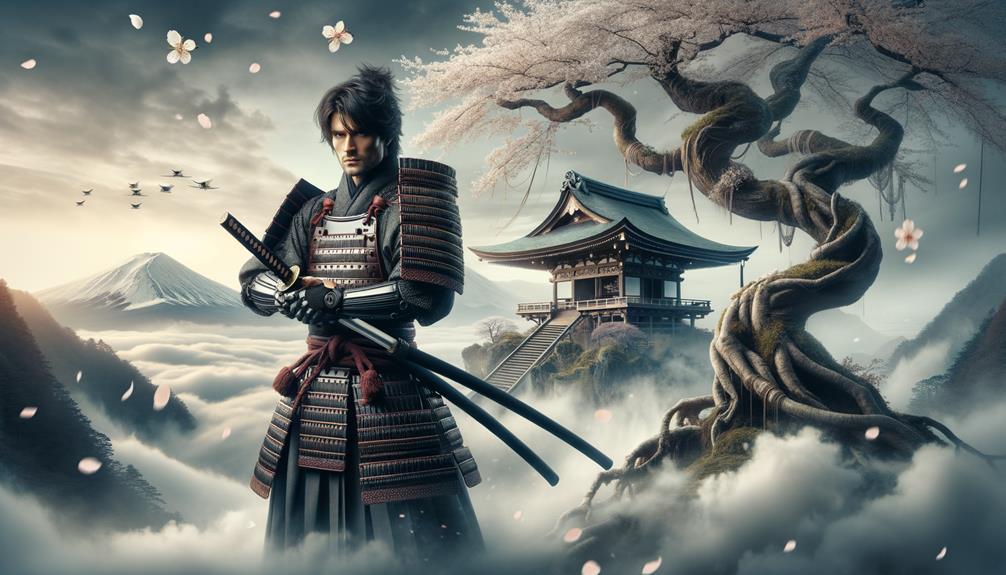Dive into the world of the samurai, and you might feel as though you've journeyed back in time. It's a time when honor was as keen as a katana's edge, in the world governed by the Bushido Code. These principles steered the samurai, the classic Japanese warriors, through life and death. The more we delve into this complex mythology, the more it becomes clear that samurais were more than just warriors. They represented a deeply rooted cultural ethos. The Bushido Code wasn't all about martial skills; it also valued wisdom, honesty, and respect. But like any historical ideas, it's often misunderstood and given a Western twist. So, let's set out on a journey to reveal the true nature of the Bushido, its impact on modern-day Japan, and the lasting legacy of samurai mythology.
The Origin of Bushido Code

When you take a close look at Samurai culture, the origins of the Bushido Code become a focal point. This set of guiding principles didn't just direct these warriors in battle, but also had a significant effect on their roles in society and their personal behavior. The Bushido Code sprouted from the Heian period, a time when warrior clans were shaping Japanese culture. This era was marked by the creation of Samurai armor and weaponry – symbols of their might and honor. The exhibit does a superb job of illustrating this, displaying items such as horse saddles, stirrups, and swords.
Turning our attention to a specific period in Japanese history, it stands out how the arrival of firearms in the 16th century brought a seismic shift to Samurai warfare. The opulently decorated guns displayed in the exhibition remind visitors of the stories of the Genpei War. This was a critical clash between the Minamoto and Taira clans. Woodblock prints act as mute storytellers of these intense battles and powerful Samurai leaders.
The influence of the Bushido Code wasn't restricted to the battlefield. It also reached into the arts, literature, and the tea ceremony, further emphasizing the Samurai's imprint on Japanese culture. The exhibition brilliantly presents their support of Noh theatre and their effect on the tea ceremony.
Key Values of Samurai Warriors
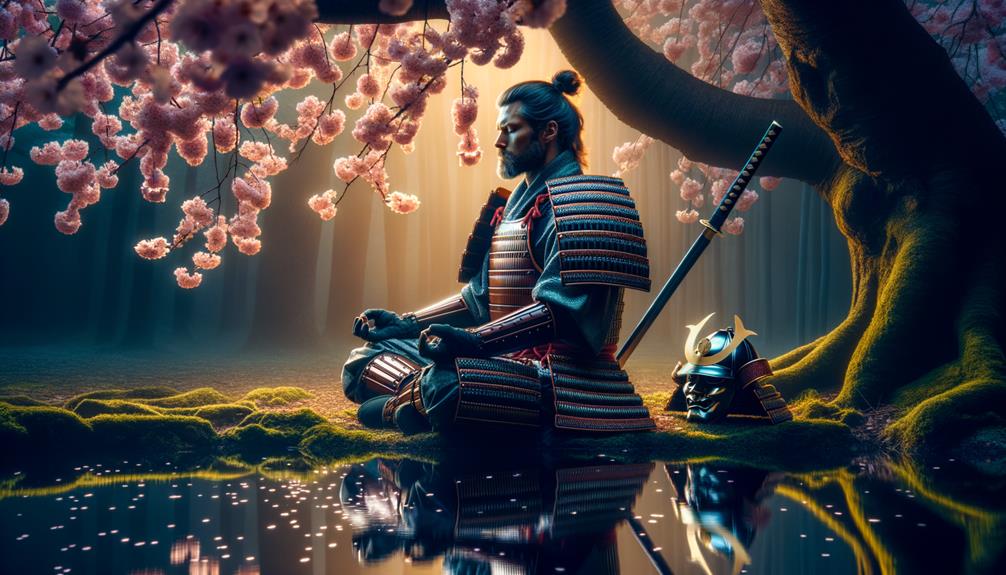
The Samurai warriors' key values were guided by the Bushido Code, a complex blend of loyalty, courage, honesty, kindness, and honor. This unwritten moral code was a crucial aspect of shaping Japan's warrior class. As masters of martial arts, the samurai lived this code not just in warfare, but in their everyday life.
- The Impact of the Bushido Code on Samurai:
- Martial Arts: The samurai specialized in using weapons, particularly the katana. Their approach to war stressed the importance of patience and discipline.
- Effect on Japanese Culture: The Japanese tea ceremony mirrors the samurai's appreciation for beauty and simplicity.
- Buddhism, Shinto, and Confucianism: These belief systems helped form the samurai's ethos and influenced the politics and culture of feudal Japan.
Even though the Meiji Restoration signaled the end of the samurai class, the Bushido code remains an integral part of Japanese society. I think this is a clear indication of the lasting power of these values. The samurai's influence spans time, shaping both Japan's history and its present. Their legacy continues to resonate in Japan's heart.
Misconceptions Surrounding Bushido
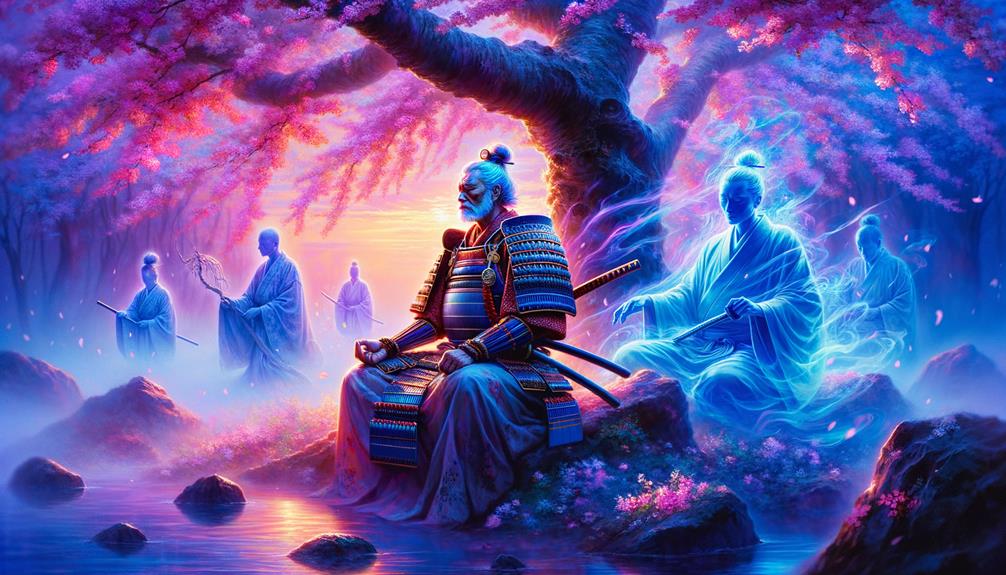
There's no doubt that the Bushido code had a significant impact on samurai and Japanese culture. However, it's worth clearing up a few commonly held beliefs about its usage and interpretation. For starters, there was no one-size-fits-all approach to the Bushido code among samurai in Japanese society. It was applied differently across various clans and regions, often mirroring local traditions and ideologies.
Despite common perceptions, not every samurai was a die-hard follower of the Bushido code. Some placed personal ambition and dominance above honor and responsibility, illustrating the range of attitudes within the samurai class. And the idea of Bushido as an age-old, unchanging moral code? That's not quite right. The truth is, it transformed and adjusted over the centuries in response to Japan's social and political changes.
Also, let's clear up the myth that samurai were singularly obsessed with dying honorably in battle. They appreciated life too, and often looked for peaceful solutions to disputes. The stereotypical image of the unfeeling, stoic samurai only tells half the story. They were actually quite cultured, deeply involved in the arts and cultural refinement, making them much more multifaceted than typically portrayed.
The Influence on Modern Japan
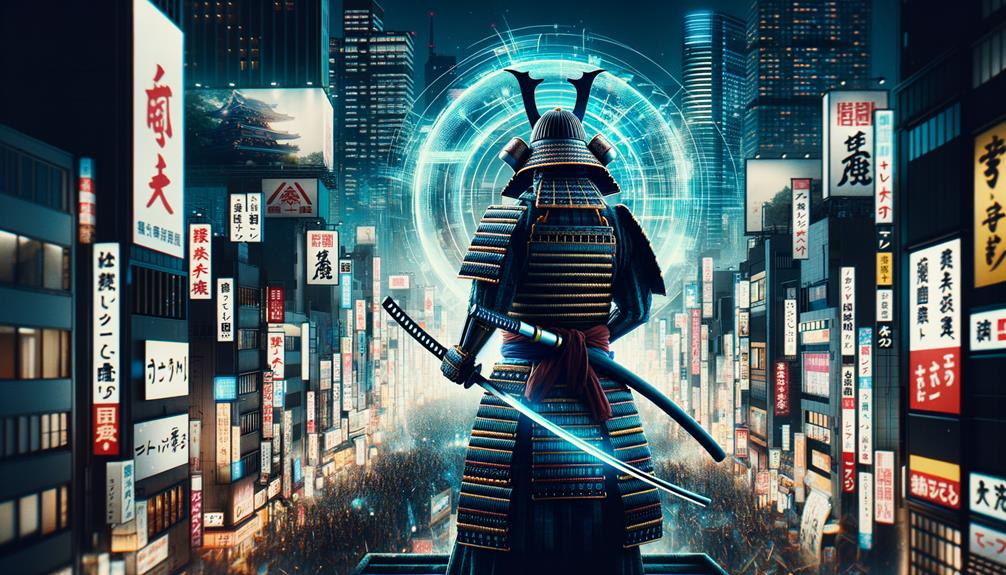
When we delve into the history of Japan, the impact of the samurai class, even after its decline during the Meiji Restoration, is hard to ignore. Their legacy, most notably the Bushido code, is deeply woven into the fabric of modern Japanese society. And this isn't just about history – it's a living, breathing part of their culture, their values, and even their business ethics.
Let's talk about the Bushido code – a code that champions loyalty, courage, and honor. It's a key part of Japanese values and plays a huge role in how they perceive the world and live their lives.
Then there's the mastery of martial arts and the strategic warfare tactics that the samurai were so adept at. These have had a profound impact on how modern Japanese society thinks about discipline, patience, and strategic thinking.
And even though the samurai class may have declined, their image is alive and well in Japanese media and literature, serving as a testament to their continued influence on modern Japanese society.
The impact of the samurai isn't just a matter of historical interest. It's a powerful force that has shaped a society that prizes honor, loyalty, and discipline above all else. The more we learn about samurai mythology and its impact, the more we see how this ancient warrior class continues to shape the land of the rising sun.
Enduring Legacy of Samurai Mythology
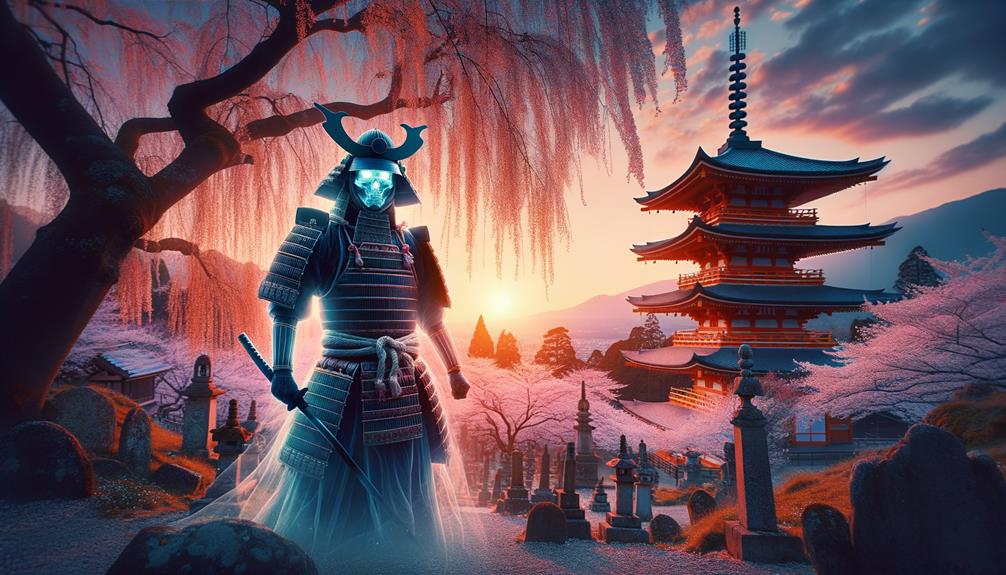
Taking a deeper look into the long-lasting effects of samurai mythology, we can see its profound influence on modern society. Samurai principles and teachings haven't faded into history, instead, they continue to shape many facets of contemporary Japanese culture. This includes everything from martial arts to the refined tea ceremony.
Let's take a look at a table that breaks down some key aspects of the samurai legacy:
| Legacy Aspect | Brief Description |
|---|---|
| Martial Arts | Samurai warriors were highly skilled in martial arts, affecting disciplines such as Judo and Kendo. |
| Tea Ceremony | The tea ceremony, also known as 'Cha-no-yu', was perfected by samurai and emphasises simplicity, respect, and tranquility. |
| Literature | Stories and philosophies of samurai have greatly enriched Japanese literature, influencing works such as 'Hagakure' and 'Bushido: The Soul of Japan'. |
| Visual Arts | Samurai symbols are common in Japanese visual arts, seen in painting, sculpture, and even in films. |
| Spirituality | The samurai's Bushido code has had a significant impact on Japanese spiritual beliefs, particularly Zen Buddhism. |
In short, the impact of samurai mythology hasn't been limited to the 11th century but has woven itself into the very fabric of Japanese society, adding to its unique cultural identity.
Frequently Asked Questions
What Did the Code of Bushido Instruct Samurai to Be?
The Bushido Code served as a moral guide for samurais, teaching them to embody principles such as honor, bravery, honesty, and loyalty. It was their ethical roadmap, steering their actions and attitudes in every aspect of life. From the battlefield to everyday encounters, the Bushido Code was fundamental in shaping a samurai's life.
What Was the Bushido Code That Samurai Had to Follow?
So, you're curious about the Bushido code, the moral principles that the samurai lived by? Well, this code was their guiding light, underlining key values like loyalty, bravery, honesty, empathy, and respect. It influenced their every move, shaped their lives, and imprinted on their spirit. It wasn't just a rule book for them, it was their way of life.
Did Musashi Follow Bushido?
So, did Musashi stick to the Bushido code? Well, not exactly. Musashi was more about practical tactics and valued being flexible more than sticking to old customs. His teachings may have raised some eyebrows, but they offer a fresh take on samurai culture and their approach to battle.
What Was the Samurai Code of Bushido How Was It Tied to Shinto Culture?
The Bushido, or the code of the samurai, puts a high value on loyalty, bravery, and honor. Its roots are intertwined with the Shinto culture, mirroring its respect for nature, its rituals, and its faith in kami, which are spiritual beings. It's like a captivating mix of moral principles and spirituality. Sounds interesting, doesn't it?

